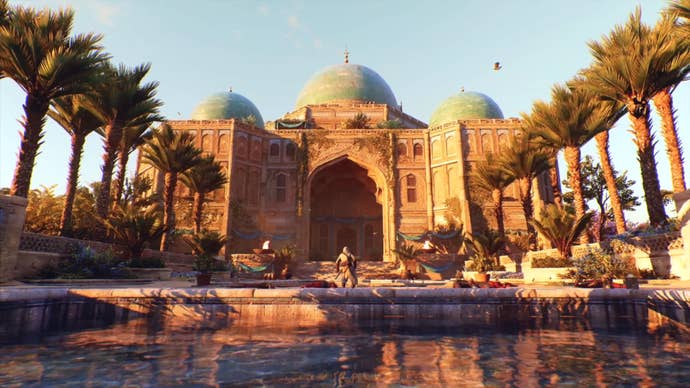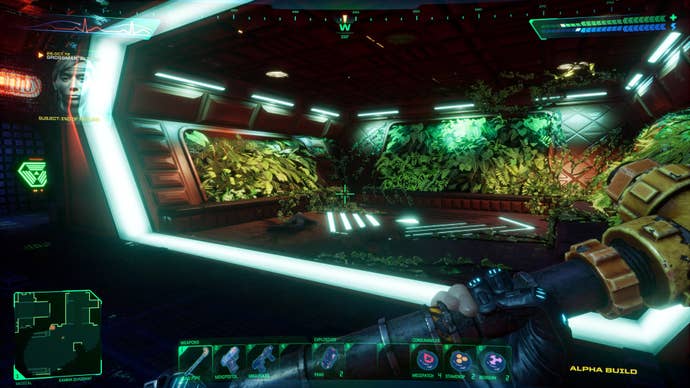Products You May Like
At one time, there were rumours abound that the upcoming Assassin’s Creed: Mirage would lead directly to (or be packaged with) a full-blown ground-up remake of the original game. It’s easy to see how this idea gained traction – Mirage has been sold to us from the start as something of a back-to-basics reset for the series that harkens back to the original game’s city-based gameplay and is set in the same “global region”.
So, it might seem like a no-brainer. The assets made to recreate 9th century Baghdad could surely be repurposed into a facsimile of 12th century Damascus. It makes sense, if you don’t get hung up on the fact that the two places are roughly as far apart in space and time as modern-day Paris and, er, Cromwellian Liverpool. In any case, Ubisoft staffers seemed keen to pour cold water on that prospect last year. Perhaps the project was shelved. Or, perhaps, Assassin’s Creed: Mirage is enough of a remake in itself that a separate, more explicit project is considered unnecessary.
The thing about video game remakes, right, is that they’re great for onboarding newcomers, but they’re not necessarily that interesting for veteran fans. Take the recent ground-up PS5 remake of The Last of Us, for example. It offered a fresh and modern interpretation of the original story and was well-placed to induct new audiences – some from the TV show, some who were simply too young to have gotten into it ten years ago – into the fandom of the world’s most discussed-to-death 7/10.
But for those of us who were there back in the day, it offers little more than a chance to retread old ground. Ground that has been positively trampled into a muddy sludge between the original, the remaster, and the TV series that lifts much of its beats directly from it. And it’s not the only videogame remake to offer a pristine carbon copy of an existing story retold with more polygons and shaders: this is a phenomenon that has graced everything from b-tier schlock like Destroy All Humans to critical darlings like MGS3: Snake Eater and System Shock. Remakes that are substantial, but that dare not alter the substance itself (even in cases where there’s little of it to go around).
It strikes me, then, that as a fan of Assassin’s Creed from the beginning, Mirage is the best kind of proposition: a quasi-remake that will remind me of the game I fell in love with all those years ago, that carries a similar look and feel, and rehabilitates its classic systems and mechanics for modern sensibilities, but one that moves the story forward and is liberated from having to repeat less appealing elements.
Although it has enjoyed something of a Prequel Trilogy style reappraisal in recent times, the fact of the matter is that on release AC1 was considered something of a disappointment. The repetitive investigation tasks made it feel tired after the third mission, and this wasn’t helped by the fact that almost every system felt janky as hell, from the “why is he just kneeing the wall” parkour to the extremely irritating tailing and pickpocketing that was either too easy or infuriatingly impossible depending on the mood your Xbox was in at the time. You could argue that a lot of these were skill issues, but the game’s bleak, overexposed Mid-2000s TV Drama colour palette and well documented pacing issues (“Another modern day scene? Really?”) certainly were not.

For the record, I adore the original game, and I think it deserves its place alongside the franchise greats like its direct sequel, or everyone’s favourite pirate simulator Black Flag, or the unassailably beautiful Origins. Every AC has its own quirks and foibles that make it unique, and AC1’s shortcomings are an integral part of its identity. They certainly don’t stop it from being a beloved classic.
But they shouldn’t necessarily be repeated. And with Mirage, Ubisoft has relieved itself of any obligation to do so. Instead, it looks set to be a vibrant celebration of the entire series so far: the thundering comeback of the city based gameplay of old, with dense crowds to shove past and skybox piercing towers to leap from. A return to the wonderful Middle East, which is still the series’ most fascinating playground: from the bustle of Ottoman Constantinople, through the majesty of Ptolemaic Egypt, to the war weary stoicism of Syria and the Kingdom of Jerusalem during the Crusades. And yet, it is a direct spin-off of the most recent game in the series, with all the benefit of the endless refinements and trial-and-error evolutions that have happened along the way.

So, it remains up in the air whether Ubisoft will give fans a remake of the Marmite original. It would be stupid of us to rule it out entirely, but given what’s been said, it doesn’t look like it’s actively being worked on at the moment. Mirage, though, is something far more exciting than that: the brilliant, intoxicating spirit of the original game given a new earthly vessel. One with a gorgeous and rich colour palette, the incredible architecture of one of history’s most lively world cities, and a brand new story and characters to keep the series’ momentum going in a forward direction.
If I had a binary choice between what Mirage is offering, or a drab and painstaking recreation of something I’ve already played, with better graphics (but not necessarily better art direction), I’d choose Mirage. Besides, as my friends and twitter followers are sick of me pointing out, you can play the first Assassin’s Creed in glorious uprendered 60fps on Series X/S consoles, and as I explain in the video surreptitiously embedded at the top of this article, there has never been a better time to revisit it. It’s as fiddly as it ever was, but it looks absolutely gorgeous – almost like a remaster – and it’s fascinating to see just how much of what we tend to associate with the modern AssCreeds was actually always there. If you haven’t already, you owe it to yourself to try it in this form.

Unless you don’t have one of the new Xboxes, I guess. I dunno. What do you even want from me? I’m shocked anyone reads this far anyway.
